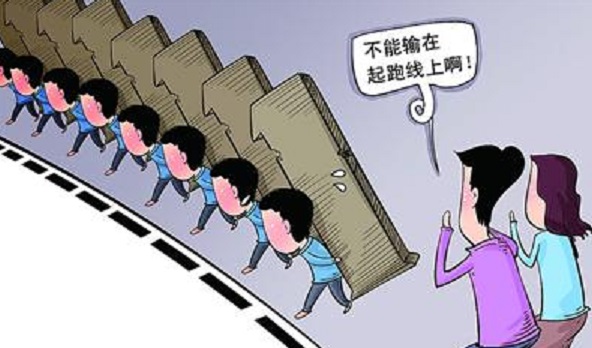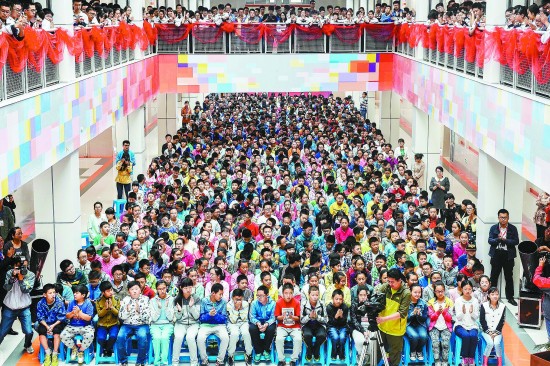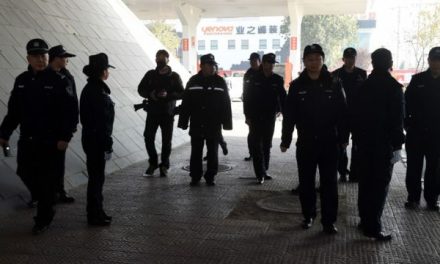By Bai Ding

Caption: Don’t lose at the starting line!
Don’t let the child lose at the starting line” is the mantra of Chinese parents nowadays, and for children it is also a curse. Accompanying this mantra are various on- and off-campus tutoring industries and the concept of obtaining housing in better school districts, all of which vacuums up family savings. But where does the track lead? What is the purpose of running so fast? Probably not many parents have considered this kind of question, let alone do they know the answer.
Anyone who has watched a race knows a truth: if you run a long-distance race at sprint speed, you are doomed to fail, and vice versa. And if there is no clear finish line, no matter how superb one’s competitive skills are, they cannot guarantee victory in such a race. The same reasoning applies to education, where the goal is also some finish line in that race.
The traditional road has been blocked
China has long paid attention to education, and the purpose of receiving it was traditionally very simple and clear, that is to pass the imperial examination to enter the ranks of officials and gentry. This path no longer works today. Although the ratio of officials to people in China has now reached the highest point in history and throughout the world, the positions of officials today’s have long been held by certain classes, and their descendants have already stood on the finish line and so can obtain official positions without truly having to take the field. Yet those who want to pass the exam to actually get ahead are undoubtedly the children of common people from outside this particular class, so for them, the plan to enter an official career through something like traditional education is just wishful thinking.
The road to an official career has already been blocked, so what opportunities are left for the children of common people who become educated? European and American educational concepts and the educational choices of European and American families may provide some inspiration and help for Chinese parents and children.
Western Education as Enlightenment
In Europe, the United States and most free and open countries, the primary purpose of education is to help children discover and release their potential. Through the joint efforts of the family and the society’s education system, each child will become a person who not only has general knowledge but is also different from others with respect to specialties and skills. The graduates cultivated in this way are members of society who can cooperate, be compatible and complement each other; the whole society thus becomes more distinctive and full of vitality because of their participation.
This educational concept matches with the educational choice of each family. In most cases, parents encourage their children to choose courses and academic directions based on their interests and their own strengths, while families whose main consideration is income prospects are not the mainstream of society. In the eyes of children, education is a choice made with their own participation, so they regard receiving it as part of the joy of life.
In recent years, a kind of “ritual” created by students has become prevalent in Chinese schools, which is to tear up textbooks after the exams to vent their suppressed aversion to learning. If European and American children saw this celebratory rite of abandoning books, they would be astonished. They couldn’t understand why so many of their peers hate books yet study so much, just like Chinese children can’t understand why, for foreign children, learning is not a chore, but full of enjoyment.
What is “good” anyway?
In China, children who are stressed by this “starting line” concept have not had time to cultivate their interests, and they are forced to accept the education that their parents have chosen for them, which they will come to hate. The criteria for all parents in choosing their children’s studies almost never vary: whether they can lead to good jobs, high incomes and stable lives in the future. But no one seems willing to take a few moments to reflect. What is a “good” career? What income level is considered a high income? In a Chinese society that lacks the three basic social-security protections (universal health care, equal education, and a stable pension mechanism) and legal protection, even if you have a good job and high income, will you be able to guarantee a stable life?
Whatever the standard for measuring “good careers” might be, the current reality is that the vast majority of college graduates in China not only have no chance of “good jobs,” at least half of them can’t even find jobs that are relevant to what they have studied within one year of graduation. Ironically, China’s express-delivery and food-delivery services proudly announce that the proportion of their employees with college degrees is increasing every year.
Due to the lack of jobs, many college-educated people have to engage in another job: serving as online activists or outright trolls, being paid to engage in online propaganda for the government (that is, serving as what is commonly known as wumao or “fifty-cent workers”). Compared even with express-food delivery, these jobs are more than low-grade and shameless. No parent would proudly show off to relatives and friends, “Look at how promising our children are, they have a college degree and do wumao work!”
The ultimate expectation of most Chinese parents for their children is to have a high income. To this day, countless families still bury their heads in the sand and are unwilling to face this reality: Chinese young people have the highest proportion of economically idle people in the world (they are said to be “gnawing on the old”), and a large part of them are doing so with college diplomas. Those young people who are lucky enough to find a job away from their parents but cannot bear the high cost of living due to their meager income must choose to share costs or even live together to reduce expenses. Most of their residences are very distant from their workplaces, so they must float like the tides for hours every day between their workplaces and their places of residence. A few years ago, there was a passage that purported to be foreign media describing Chinese young people:
“Young people in China… could have recited poems, traveled together, and participated in book clubs. But now, they become middle-aged people instantly after graduating from college, and they spend their money on daily necessities, just like middle-aged people do. Their lives, from the very beginning, revolve around material necessities, but they are not able to experience a romantic life, a way of life oriented around the soul.”
And that was the situation a few years ago. Today’s young people are even more miserable than those back then. They can hardly even obtain a substantial and sophisticated life, let alone a stable one.
The Mistakes Made by Chinese Parents
Where do the mistakes made by Chinese parents lie?
They erroneously think that all must run toward the same goal, and they mistakenly regard reaching it as soon as possible as the priority of life. When all people are fighting for the same goal, they will certainly fight each other out of self-interest, and there will be no sympathy or cooperation among them. And in order to reach the destination as quickly as possible, a person will have no time to tend to and enjoy the beautiful scenery available during the journey. After such strife and fevered pursuit, even if one is the first to reach the finish line, except for letting out a sigh of satisfaction, his or her list of accomplishments in life is still empty.
Chinese parents also make the mistake of thinking that two wrongs will make a right. Those Chinese parents who believe in “not letting their children lose at the starting line” are mostly members of the lost generation who think they already “lost at the starting line.” This reinforces their belief that if their children had worked harder on the paths they failed to succeed in, they would have produced very different results. But they still haven’t been able to understand: their own “loss” was not because they didn’t work hard, but because they ran too hard on the road actually designed for them, a road that guaranteed that they wouldn’t win.
Chinese parents are even more wrong to regard the current Chinese education as the only reasonable education. Contrary to the European and American educational philosophy mentioned above, the purpose of Chinese education is to make all people look the same. The only advantage of this is that it works for the government, making it easy to use, store and manage human resources like standardized parts. The disadvantages of doing so fall on every individual ordinary person. The collective identity of “the people” determines that the value of an individual is only for filling him/her up with whatever is required (for example, the most frequently cited “Chinese market of 1.4 billion people”), So every individual may be replaced, abandoned or even sacrificed on demand at any time.
The moment Chinese parents fill their brains up with the need to send their children to good school districts, confidently thinking that they thus have placed them in a favorable position at the starting line, their children have already lost.
Their own children will use the same reasoning to guide the lives of their own children in the future.
Conclusion
Recently, a Westerner who taught in China for many years commented after leaving China on Chinese education. He said it is a cold machine that cheats children of their childhood through homework and exams. Children have been fed through the education system. with abstract dogmas since childhood, and thus have gradually abandoned the beauty, kindness and gentleness of human nature. Its end product is an emotionless and morally empty human waste.
What is worrisome is that this is not just the current situation of Chinese education, but a growing trend for the future.
2023.07.26
This piece was translated from Yibao Chinese. If republished, please be sure to add the source and link before the text https://www.yibao.net/?p=247571&preview=true when reposting.
The views of the author do not necessarily represent those of this journal.





















